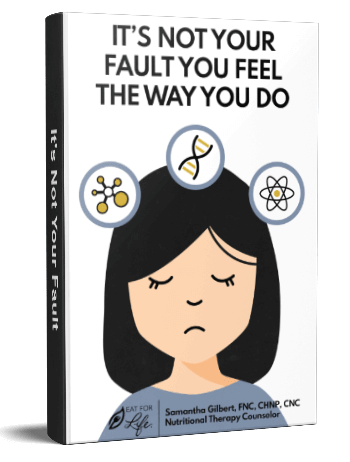How Epigenetics Can Save Your Life
A friend of mine has two children, both boys. She was raised in a strict vegan family, so was the father of her children.
Years later, her husband developed numerous health problems and decided to incorporate animal products into his diet. She also developed nutrient deficiencies, but refused to eat animal products.
This ended their marriage.
The youngest boy went to live with his dad, the eldest went to live with his mother.
The eldest son was four years older than his younger brother, but suffered terribly from asthma, depression, low body weight, infections, lack of energy, and an inability to retain information. He had no desire to attend college and isolated himself socially. He maintained a strict vegan diet.
On the other hand, his younger brother was six inches taller, athletic, happy, and earned a full scholarship to Texas A&M University to study engineering. Living with his father, he ate animal products.
Both brothers share DNA, but due to epigenetic insults, the older brother actually exhibits a different DNA structure; one of malnourishment due to hereditary nutrient deficiencies.
This is the science of epigenetics.
Epi means to be over, outside of, or around, so the literal translation is above genetics. In other words, the epi genome doesn’t change your DNA; it decides how some genes are expressed in your body.
Think of your genome (DNA) as the hardware and the epigenome as the software. To put it another way, the genome does all the work; the epigenome tells it what to do.
Epigenetics looks at what happens to your genes over the course of your life and whether those changes could be passed down to your children and grandchildren.
You have billions of cells in your body and they each contain the exact blueprint of your genetic code. Just because they have the DNA doesn’t mean they know what to do with it; they need outside instruction from carbon and hydrogen compounds called methyl groups.
Methyl groups control the genome by binding to a gene and telling it to express itself or not. Methyl groups bind differently to a genome in a skin cell versus a liver cell and so on. This is one of the ways the liver cell knows it’s a liver cell.
Epigenetics is also controlled by histones, which are basically protein spools that DNA winds itself around. Histones can change how tightly or loosely the DNA is wound around them. If they’re more loosely wound the genes can express more and if they’re tightly wound they express less.
Methyl groups are like a switch and histones are like a knob.
Every cell in your body has a distinct histone and methylation pattern, and this is what gives every cell its marching orders. If the methylation pattern is imbalanced, deficiencies ensue.
Your DNA remains the same, but epigenetic tags do change throughout your life as they decide which genes get expressed and which ones don’t. Epigenetic cells are not permanent and change over the course of your life; they can be hereditary, and also change over time, especially when your body is going through a lot of changes such as in puberty, menopause, and pregnancy.
The epigenome changes suddenly throughout our entire lives based on a lot of environmental factors like what we eat, smoke, drink, and how stressed out we are on a daily basis.
A bad diet can lead to methyl groups binding to the wrong place and making mistakes; with those bad instructions cells become abnormal and turn into disease. This is when we start to see things like diabetes, cancer, and autoimmune syndromes.
We now know that certain types of cancers are caused by misplaced epigenetic tags, and that epigenetic insults are passed down from generation to generation. The same holds true for things like premature greying of the hair and baldness.
My friend’s dietary choices altered her future offspring (as did her parents before her), but her youngest son was able to retag his epigenome with a therapeutic diet and supplementation.
Epigenetics does not change the DNA sequence, but rather it turns off the bad genes and turns on the good ones. The really cool thing is that this can create a gene imprint that can be passed on from generation to generation. This is why a nourishing, real-food diet is essential if couples want to produce healthy, thriving children.
Obesity, heart disease, cancer, autoimmune diseases, and much more are at an all-time high. Our great-grandparents didn’t experience the same insults because they weren’t subjected to the vast amount of environmental toxins we deal with today.
The more stress, processed foods, and other environmental toxins we’re exposed to, the weaker and more disease-prone our offspring become.
And this is the power of epigenetics.
Please share this post! It is through sharing that we create community, eliminate guilt and shame, and bring about healing. Learn more about undermethylation and overmethylation.



Is the MTHFR test more accurate than blood histamine?
No the best test is a whole blood histamine test bc it measures if one is over or under methylated. Without that crucial info treatment will certainly suffer.
DHA – direct healthcare access offers a whole blood histamine test – above 70 indicates UM and below 40 OM. 40-70
Is normal methylation but close to either UM or OM May also be treated
This article is interesting. In my case it appears I was born with anxiety, ocd, perfectionist tendencies. I can remember right back to the age of 5-6. I was a quiet baby did not cry much compared to my brother who was boisterous. I was bullied throughout school because I was quiet. Writing had to be perfect, starting and not finishing tasks all the time, attention problems, sensitivity to smell, sound… My diet as a child was definitely perfectly balanced. Yet. I still suffer all thes issues.
What do you think is the issue, is it undermethylation?
This is impossible to determine without an assessment and testing. Please do not assume you are undermethylated. More investigation and proper testing must be done to determine biochemical status.
I do not understand how two children can have the, “exact same DNA” if they are not twins. Can you explain further?
What tests do you recommend to determine epigenetic needs?
Hi Jill,
Testing would be determined after a proper assessment. Schedule a complimentary consult with me to see how I can help.
Could you please lead me to information that will assist my recovery as an overmethylator with high copper levels.
Thank you
Alison
Hi Alison,
I’d love to offer you a complimentary consultation to see how I can help. Please email my assistant here and she’ll get you scheduled.
Hi Sami, Just wondering do you work with people who are doing Dr. Yasko’s protocol?
Hi Erin,
Yes, I do.
Great explanation — thank you!
You are most welcome Sally. Thank you!
Indeed, great explanation. Very well put.
Thank you Solomon!